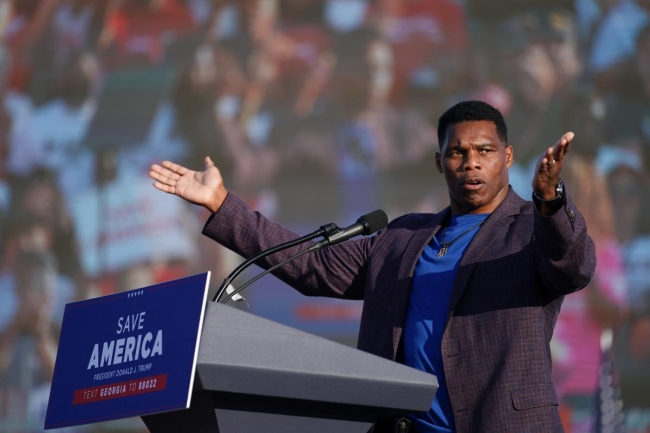You have /5 articles left.
Sign up for a free account or log in.

Herschel Walker at a campaign rally in September, where he appeared alongside Donald Trump. Walker has come under fire for lying about graduating from the University of Georgia.
Sean Rayford/Getty Images
Before Herschel Walker entered Georgia politics as a Trump-endorsed Republican Senate candidate, he was perhaps best known in the state for his connection to the University of Georgia. As a star football player in the early 1980s, he put the Bulldogs in the national spotlight, helping them win three consecutive SEC championships and becoming the college football powerhouse’s second ever athlete to win the Heisman Trophy.
Walker, who won his Senate primary last month, put his alma mater back in the headlines earlier this spring by repeatedly lying about his academic record during his campaign.
The former NFL running back claimed he earned a bachelor’s degree in criminal justice and graduated in the top 1 percent of his class at UGA. In reality, he did not graduate at all: he left UGA in his junior year to play in the short-lived United States Football League before moving to the NFL.
Walker has since denied ever claiming to have graduated, a statement that itself has been disproven.
Walker—who has also questioned the theory of evolution by asking, “If it’s true, why are there still apes?”—has spread blatant misinformation about more than his academic record. Last month he said that former president Donald Trump never claimed the 2020 election was stolen, despite ample evidence to the contrary.
Walker is far from the first U.S. politician to be caught fudging his academic record. Candidates for state Legislature in Oregon and Florida have dropped out of their races after claiming degrees they never attained. North Carolina Representative Madison Cawthorn lied about being accepted to the U.S. Naval Academy. And former Delaware Senate candidate Christine O’Donnell faced backlash in 2010 when two universities denied she’d earned the degrees she claimed.
James Thurber, a professor of government at American University who has studied ethics in political campaigns, said the main reasons politicians lie about their academic records are salesmanship and pride.
“Politicians have egos, and sometimes they just want to make their narrative sound a little better than it really is,” he said. “I think one of the reasons they do it is they feel a little insecure, and they want to build up their reputation by exaggerating.”
The problem goes beyond politics. Former CEOs of Yahoo, Bausch & Lomb, and RadioShack all faced professional consequences for lying about their academic credentials. Higher education officials themselves aren’t immune, either: in 2007, MIT’s longtime dean of admissions resigned after it came to light that she’d fabricated all three of the degrees she said she had when she’d applied for the job.
So when influential people lie about their academic credentials, what should their alma maters—or alleged alma maters—do about it?
‘A Complex Tightrope’
Teresa Valerio Parrot, a higher education communications consultant (and blog contributor to Inside Higher Ed), said that when public figures misrepresent their academic credentials, it puts the institutions they associate with in a difficult position. Do they correct the claims and risk angering an important alumnus, or stay silent and allow misinformation about the degrees to go unchallenged?
“If somebody wants to align with our institutions, that’s important, but we need to ensure that they’re being truthful [about] what their relationship is,” Parrot said. “In the end, it’s the reputation and the integrity of the institution that is on the line.”
Herschel Walker, for instance, is a legend at UGA, an influential figure with the potential to draw students, faculty, staff and alumni donors to the university where he made his name. He has also donated at least $10,000 to the institution, according to the university’s 2020 donor honor roll.
“I think that Georgia is doing a good job of walking a very complex tightrope,” Parrot said. “Figures like Herschel Walker really do give a boost not just to the athletic department for institutions, but to the overall admissions process. And their association with the institutions, if positive, can reap benefits for their enrollment processes.”
FERPA Considerations
In many cases, institutions may not be legally allowed to correct public figures’ claims about their academic records. The Family Educational Rights and Privacy Act makes it difficult for colleges and universities to disclose academic information about students and alumni without their express consent.
“The hands of the institution are tied in a lot of ways from getting specific with the details of a person’s educational record,” said Alexander Bilus, an attorney who counsels higher education institutions on data privacy issues.
One exemption is directory information, which universities are allowed to disclose as long as a student doesn’t choose to opt out. That includes a student’s name, major and degree status, meaning that Walker’s false degree claim likely falls outside FERPA’s protections and is fair game for correction. But for more specific records, like GPA or even class ranking, correcting public figures’ statements might put institutions in noncompliance with the law.
“There is a tension between the public having the right to know the truth about people running for office and the privacy of people’s education records,” Bilus said. “Right now, that’s been resolved largely in favor of protecting privacy.”
Parrot said that while there are instances when an institution may choose not to reveal information about a former student’s academic experience, in the case of high-profile figures claiming degrees they never earned, colleges and universities are invested in publicly discouraging that practice.
“One of the fundamental areas of credibility for an institution is maintaining the records of who graduated,” she said. “We’re really talking about an institution living one of its most fundamental responsibilities as the record keepers of what it means to earn that diploma.”
Staying Out of Politics
Parrot said that for higher education institutions, correcting a politician’s claim of academic achievement can create unwanted complications—especially for a politician who is actively campaigning for office.
“One of the things you want to make sure you aren’t doing [as an institution] is playing into the political nature of an election,” Parrot said. “It can really become a vulnerability for the institution if they get intertwined in it.”
But when public interest is at play in a campaign, Parrot said institutions may choose to respond to a politician lying about their academic credentials the same way they would to any employer who questions an alumnus’s résumé.
“It’s not unusual for institutions to confirm receipt of a diploma for employers when they’re asked,” she said. “In [Walker’s] case, the employers would be the voters of Georgia.”
Sometimes, it is in an institution’s best interest to promptly set the record straight. Kyle Rittenhouse, who shot and killed two protesters in Kenosha, Wis., in 2020, recently claimed on a podcast that he would be attending Texas A&M University. The university quickly refuted the claim, saying Rittenhouse “is not a student this summer and will not be enrolled for the fall.”
Parrot says Texas A&M’s simple response is a model for how institutions can debunk misinformation while avoiding getting caught in the politically charged crossfire. But in other cases, she said, that vulnerability can make colleges and universities hesitant to get involved at all, even when they could easily disprove a politician’s false claims.
“Some institutions may want to get out in front of this and try to distance themselves from a political conversation that they don’t want any part of,” she said. “Most institutions, I think, try to stay out of that conversation altogether.”
Thurber said that higher education institutions often issue short, declarative statements if prompted by the news media, but that any larger statement on a candidate’s academic embellishments is exceedingly rare.
“Institutions are very, very careful about that,” he said. “There’s no upside to getting involved in the middle of a political campaign … Silence is better than too many words about it.”
The consequences for lying about one’s academic credentials—and lying in general—have changed since Thurber’s days working in politics in the 1970s and ’80s. He remembers Joe Biden’s first presidential campaign in 1987 and said it was a “big deal” when Biden came under fire for claiming he’d graduated in the top half of his class at Syracuse University law school, when he had in fact graduated 76th out of 85.
“Lies that are just little things now were big then and could end a candidacy,” he said. “The standards of truth have changed dramatically in the last 20 years, especially since Trump was in office.”
Beyond legal and public relations considerations, Parrot said that a commitment to truth as a core value of higher education should drive the decisions an institution makes.
“Whether we’re talking about plagiarism, or we’re talking about claiming a degree that hasn’t been earned, so much of our credibility is tied to that fundamental element of truth associated with being an honest broker,” she said.





